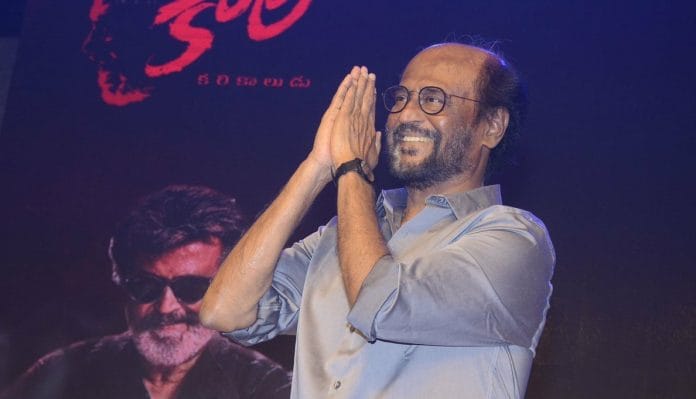Rajinikanth’s complete cooperation with Pa. Ranjith and his political ideology shows that he hopes to reap political dividend.
Kaala… Kaala… Kaala… everywhere! Not every movie is criticised or celebrated even before its release like this one.
And there is only one reason for it: ‘politics’.
The politics of the director and the actor are directly contradicting each other. The director is Pa. Ranjith, who is direct and upfront with his anti-caste politics and the current political situation, as evidenced in his previous movies Attakathi and Madras.
Ranjith had threatened the film industry when he showed (for the first time in the history of cinema) eminent Dalit leaders like Ayothi Dasar and Rettamalai Srinivasan in his movie Madras. He was abused and dismissed by casteist groups.
So, when Ranjith joined hands with superstar Rajinikanth for Kabali, he was expected to compromise on his politics. Rajinikanth likes to talk about his strong religiosity and spirituality. But Kabali shocked everyone because he even made Rajinikanth speak about Ambedkar and Dalit empowerment.
The anticipation about Kaala was also because it came after Rajinikanth’s official announcement of joining politics and launching a political party, which, he said, would advocate ‘spiritual politics’. It was not so subtle because Rajinikanth has always been a strong supporter of the BJP and its conservative right-wing politics. In fact, after Narendra Modi came to power, he was honoured with Padma Vibhushan, his elder daughter Aishwarya was selected as India’s goodwill ambassador for the UN Women organisation while his younger daughter Soundarya was made a member of the Animal Welfare Board of India besides being appointed as a member of its Performing Animals Sub Committee (PASC).
Rajinikanth chose to remain silent about the BJP’s political interference in Tamil Nadu after the demise of Jayalalithaa. However, he spoke soon after the Thoothukudi killings of Sterlite protesters by the state, but only to criticise the protesters. He blamed the ‘anti-social elements’ among the protesters for the killings, and even yelled at the journalists who questioned him.
When Rajinikanth visited the injured in the firing, a youth asked ‘Who are you?’. The anger revealed the harsh truth that Rajinikanth has never taken part in any of the people’s movement. His visit to the hospital now was political.
There were some calls to boycott Kaala because of his statements on Thoothukudi killings. But right-wing groups jumped to defend Rajinikanth. In fact, Ranjith was warned and criticised for bringing Hindutva mascot Rajinikanth into his film.
But the release of Kaala has made it clear that the movie is a backlash against Hindutva politics and its corporate contributors. The film shows Dharavi as being acquired by a Hindutva capitalist. It questions the eviction of Dalits from their ancestral settlements, and the inaction of the government to protect and support their land rights. The Hindutva villain is no one but a representation of our present-day industrialists, who in the name of Clean India, Make-in-India and patriotism exploit the downtrodden. The villain being rendered all sorts of support from the minister and police shows that the country is run by corporates.
Rajinikanth, who has played the roles of labourer and servant in other unrealistic movies, now speaks for the real issues against these capitalists. Rajinikanth, who used to give out instructions on ‘How a woman should be’, is now shown by Ranjith as being respectful of women who are courageous and speak politics.
The ultimate political touch is the portrayal of ‘Kaala’ as Ravan, which is a historical counter to the racist depiction of Dravidians in the Hindu literature. Rajinikanth, who is otherwise a supporter of Hindutva, displays the exact opposite politics in the film. That is what makes Kaala undoubtedly a Ranjith film.
Rajinikanth’s complete cooperation with Ranjith and his political ideology shows that he hopes to reap political dividends. In one scene, a policeman’s character is actually Shivaji Rao Gaikwad – which is Rajinikanth’s name in real life. And the character ends his statement with ‘Jai Bhim’. This is something which Rajinikanth isn’t likely to do in life, and he is unlikely to allow any other film character to use his real name. This makes the viewer more suspicious about his real political intention and his reel-life revolution.
While dialogues are strong as is the symbolism of anti-Hindutva politics, the film lags technically.
That apart, ‘Kaala Karikalan’ has mercilessly trounced Hindutva by stripping it off and has certainly overturned the casteist, stereotypical Indian cinema.
Kiruba Munusamy is a Dalit lawyer practising in the Supreme Court of India and the founder-executive director of Legal Initiative for Equality.







Very well written. Out and out Ranjith movie. Rajnikanth has completely surrendered himself to the script hoping to gain political mileage while the core script contradicts his real life beliefs and persona completely
Mixing movie and politics is not fair to moviegoers who want entertainment not ideology
Shame on Rajni
Its too easy to beleive a mere commercial film can derail the hindutva waves across the country. The writer of this article sees too many things conveneint from his view as a dalit activist. Its a commercial in which the director uses it as a platform to communicate symbolic things pertaining to dalit icons. Portraying Ravan as a ‘good’ character was already done by Mani ratnam in his film- what is new in this, reading roo much of dalit politics in this film is a stretch and just a convenient interpretation of one’s own perspective